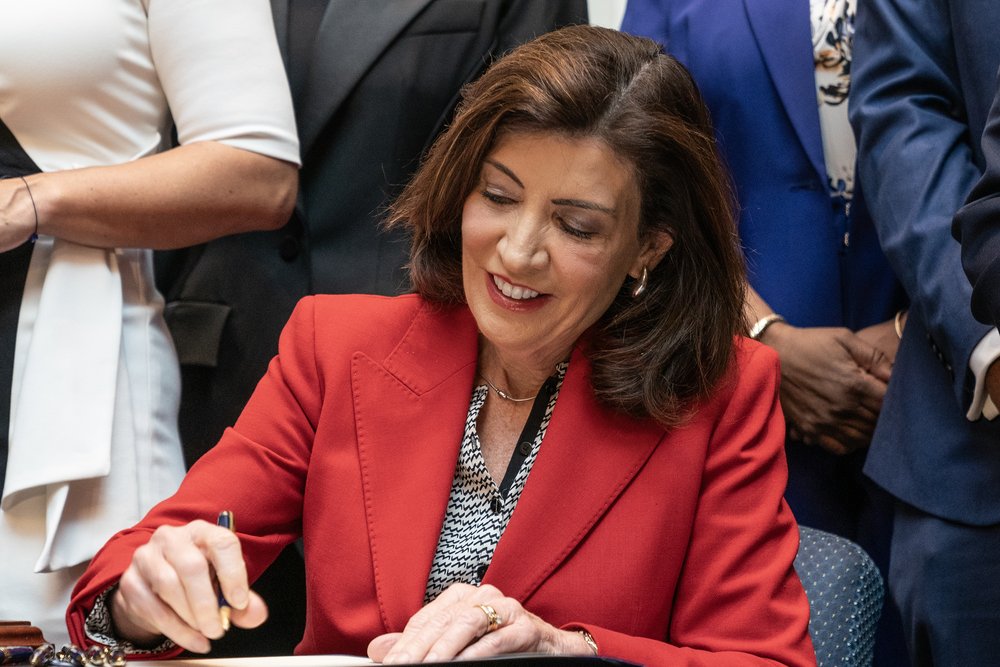New York to study paying out reparations for slavery under new state law
Dec. 19, 2023, 11:13 a.m.
Gov. Kathy Hochul on Tuesday signed a bill creating a panel to examine possible reparations over New York’s history of slavery.

New York will consider the possibility of issuing reparations, including direct payments, for descendants of enslaved African people living in the state, under a bill Gov. Kathy Hochul signed into law on Tuesday.
The legislation creates the state Community Commission to Study Reparations Remedies, a nine-member panel tasked with studying slavery's history in New York and its lasting effects on society. The panel is set to begin work within the next six months, once its members are appointed.
Among other things, the commission will recommend what the bill calls “appropriate remedies and reparations” for descendants of enslaved African people, including changes to state laws and policies.
The law allows the commission to consider whether direct compensation is warranted, as well as who should be eligible for it. Such a proposal would carry significant budgetary challenges; a California task force issued a report earlier this year recommending payments reaching seven figures for some long-term residents to account for generations of racial inequality.
“Let’s be clear about what ‘reparations’ means,” Hochul said at a bill-signing ceremony at the New York Historical Society in Manhattan. “It doesn’t mean fixing the past — nobody can do this. But it does mean offering more than an apology.”
New York is the second state to launch an official group to weigh potential reparations for slavery, following California.
In New Jersey, residents kicked off their own reparations effort in September after the state Legislature failed to pass a bill creating a reparations task force. And in the New York City Council, bills on studying reparations were introduced this past summer.
New York lawmakers approved the legislation in June, just before ending their annual session at the state Capitol in Albany. State Sen. James Sanders of Queens and Assemblymember Michaelle Solages of Long Island, both Democrats, sponsored the bill.
Hochul signed the bill while flanked by the state legislative leaders, the bill’s sponsors and civil rights activist Al Sharpton, among others.
“I stand here today a proud leader who understands that this conversation can’t be had without telling the truth — that the disparities are real, they were contrived, they were derived, they were deliberate,” said state Senate Majority Leader Andrea Stewart-Cousins (D-Yonkers), the first Black woman to lead her chamber.
But the new law is not without political or financial complications.
The vote in June was along party lines, with Democrats voting in favor of the measure and Republicans against it.
Republicans said they opposed the bill in part due to the potential for a significant price tag if the reparations commission recommends direct payments and lawmakers seek to approve them.
On Tuesday, state Senate Minority Leader Rob Ortt, a Republican from the Buffalo area, called the commission “unworkable.”
“As we’ve seen in California, I am confident this commission's recommendations will be unrealistic, will come at an astronomical cost to all New Yorkers, and will only further divide our state,” he said in a statement.
Hochul’s approval was far from a given and comes with some political risk, especially in more conservative areas of the state.
The governor had not signaled her position on the bill until she signed it on Tuesday, though she hinted at her support after an unrelated event in Niagara Falls on Monday.
Before Tuesday, Hochul had vetoed dozens of bills to create official groups to study particular issues, when those bills weren’t negotiated in the state budget process and lacked funding sources attached to them.
But on Monday, Hochul said the reparations commission bill was different.
“Many of the bills we say we’re going to veto are because they’re duplicative; these studies are already being done,” the governor said. “This issue is, I’d say, an issue of first impression. It’s not been discussed or debated in the state of New York … and there’s a lot of interest in pursuing what just a study would look like.”
Hochul, Stewart-Cousins and Assembly Speaker Carl Heastie (D-Bronx) now have six months to appoint three members each to the commission.
From there, the panel will have a year to submit its final report to lawmakers, and will be required to hold public hearings as it deems “appropriate.”
The commission’s recommendations are designed to be advisory, meaning the state Legislature and governor would have to approve any potential reparation remedies before they take effect.
Stewart-Cousins acknowledged a long road ahead before the commission issues its report and the Legislature considers action based on any recommendations.
“Yes, there will be pushback,” she said. “But our ancestors have pushed forward so we can be here at this moment.”
This post has been updated with additional information.
Reparations are on the mind in Albany and New York City Council In NJ, an ambitious plan to study slavery reparations starts on Juneteenth Queens lawmaker moves NY closer on reparations and to a messy debate The case for reparations in New York City New Jersey residents initiate their own reparations discussion after state bill fails